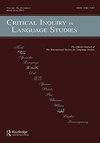“Staying with the trouble” of response-able Spanish bilingualism: a diffractive inquiry
引用次数: 3
Abstract
ABSTRACT This analysis is but one small fragment of a broader project exploring conceptions of response-able Spanish bilingualism in Australian secondary education. An initial thematic analysis revealed patterns and trends in the data but overlooked the nuanced, subtle differences regarding the ways in which Spanish bilingualism might be entangled with a number of troubling discourses and practices. Drawing inspiration from concepts in decolonial, new material, and sociolinguistic theories, I explore how a diffractive inquiry of my conversations with Spanish as a world language teachers (SWLTs) might attend to the affirmative differences and transgressive data they mention. Through this diffractive inquiry of focus group conversations with SWLTs in Australia, a multitude of response-abilities emerged relating to digital antagonisms in and beyond the classroom, the role of experimental practices in supporting Spanish and other named languages and the capacity for us as researchers to remain mindfully attentive to the generative affects present in this type of data. Hence, such an inquiry presents an opportunity to focus on previously unseen data but also invites all those engaging in critical language inquiries to question their response-abilities as researcher/teacher/learners.应对能力较强的西班牙语双语的“麻烦缠身”:一项衍射调查
这个分析只是一个更广泛的项目的一小部分,该项目探索澳大利亚中学教育中可响应的西班牙语双语概念。最初的专题分析揭示了数据中的模式和趋势,但忽略了西班牙双语可能与许多令人不安的话语和实践纠缠在一起的方式上的细微差别。从非殖民化、新材料和社会语言学理论的概念中汲取灵感,我探索了我作为世界语言教师(swlt)与西班牙语对话的发散性探究如何处理他们提到的肯定差异和越界数据。通过与澳大利亚SWLTs进行焦点小组对话的这种衍生性调查,出现了许多与课堂内外的数字对抗相关的响应能力,实验实践在支持西班牙语和其他命名语言方面的作用,以及我们作为研究人员对这类数据中存在的生成影响保持关注的能力。因此,这样的调查提供了一个关注以前未见过的数据的机会,但也邀请所有从事批判性语言调查的人质疑他们作为研究人员/教师/学习者的反应能力。
本文章由计算机程序翻译,如有差异,请以英文原文为准。
求助全文
约1分钟内获得全文
求助全文
来源期刊

Critical Inquiry in Language Studies
Arts and Humanities-Language and Linguistics
CiteScore
5.30
自引率
0.00%
发文量
23
 求助内容:
求助内容: 应助结果提醒方式:
应助结果提醒方式:


